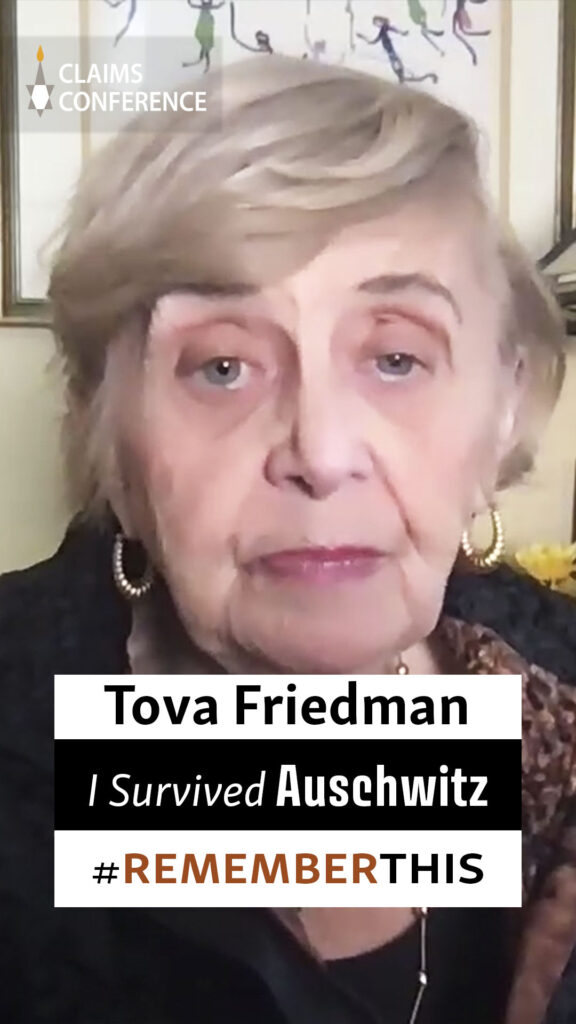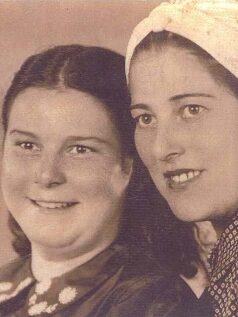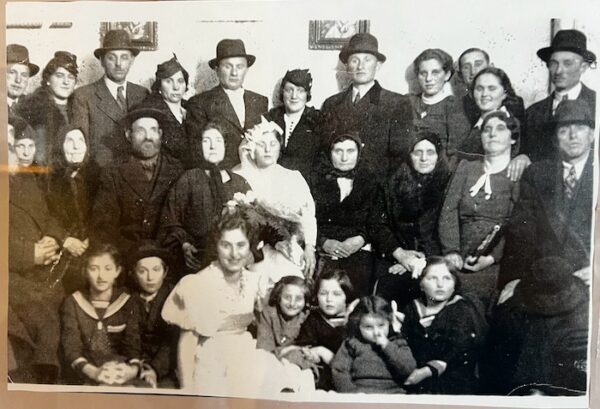#rememberthis
Before the war: Tova Friedman was born in Gdynia, Poland in September 1938. Her family was originally from Tomaszow Mazowiecki, Poland, and had returned there when the war broke out.
During the Holocaust: Tova and her family were moved into the ghetto. Tova’s mother would hide her from the Nazis’ transports several times until they were deported to a labor camp and eventually to Auschwitz. She was 5 years old. Her father was sent to Dachau. Tova and her mother arrived at Auschwitz in June 1944. Once marched to the gas chambers, Tova anticipated her death. For a reason unbeknownst to her, the children were not gassed that day. She and her mother hid from the death march and were liberated from Auschwitz. She was one of 5,000 Jewish children living in Tomaszow Mazowiecki before World War II, and at the end of the war, one of only five children from that town who survived.
After the Holocaust: Tova and her parents reunited in Poland and eventually emigrated to the US in 1950. She met and lived with her husband, Maier Friedman, in Brooklyn. Tova moved to Israel for over 10 years, where she taught at the University of Jerusalem. She was the Director of Jewish Family Service of Somerset and Warren Counties for over 20 years. Tova has four children and eight grandchildren. In 2022, she published her memoir The Daughter of Auschwitz: My Story of Resilience, Survival and Hope.

#rememberthis
Before the war: Trudy was born in 1929 in a small town called Samorin in Hungary. She was raised in a modern Orthodox Jewish household.
During the Holocaust: Right after Passover in 1944, Trudy and her family were moved into a ghetto. Her father was drafted into the army, and she never saw him again. Trudy was 14 when she, her mother, and two sisters were sent to Auschwitz. While they were immediately gassed, she was selected for labor in a nearby camp, Plaszow. Trudy was liberated from a factory camp in Bavaria by the Red Cross.
After the Holocaust: Trudy emigrated to America in 1946 with the help of her extended family. Since the ‘90s, she has been doing volunteer work in Israel, and in 2009, she accompanied her granddaughter to the March of the Living in Poland.

Trudy with her mother before the war. Trudy lost her father, mother, two sisters and grandmother in the Holocaust.
#rememberthis
Before the war: Valéria Slamová, née Propstein was born in 1928 in Čata, Hungary. She was the eldest of three children.
During the Holocaust: In May 1944, the family was interned in a ghetto. On June 14, they were deported in cattle cars to Auschwitz-Birkenau. Upon arrival, Valéria’s mother and siblings were sent to the gas chambers. Her father would die a few months later. Valéria kept together with her two cousins. She spent almost a year in Auschwitz working first in the camp’s kitchen then digging trenches in Stutthof and Gottendorf. She was sent on a death march but managed to escape to the village of Lauenburg- saving her life.
After the Holocaust: After the war, she moved to Bratislava and started a family. She lived in Israel for over two decades. Today she lives in Bratislava, Slovakia.
#rememberthis
Before the war: Vera Grossman was born in 1938 in Czechoslovakia. She has a fraternal twin, Olga.
During the Holocaust: When Czechoslovakia was invaded, the family was forced into hiding. When the family was discovered, they were sent to the Sereď concentration camp and then to Auschwitz-Birkenau in April 1944. When arriving to Auschwitz, Vera, her sister and mother were subjected to medical experiments by Dr. Mengele. Her father was taken to the gas chamber.
After the Holocaust: At liberation, their mother, Shari, learned that no one else from their family survived. Eventually, the sisters joined their mother in Israel, where Vera still lives, after years of rehabilitation in the U.K.
#rememberthis
Before the war: Viola was born in 1927 in Munkács to an observant, middle-class Jewish family. With the Hungarian annexation of her hometown, she experienced antisemitism.
During the Holocaust: In 1943, her father was sent away for forced labor. In April 1944, the Nazis used a schoolyard as a ghetto and sent Viola, her mother, sister and about 20 of her extended family members to Auschwitz. In Auschwitz, Viola worked sorting victim’s belongings. In January 1945, Viola was sent on a death march to Ravensbrück. She was then deported to Neustadt-Glewe with her mother and sister until liberation in May 1945.
After the Holocaust: Viola reunited with her father after the war and stayed in a German refugee camp for two years before emigrating to the United States in 1948.

#rememberthis
Before the war: Yisroel “Izzy” Starck was born in July 1929, in Podhorany, Czechoslovakia as Yisroel Storch. He and his three sisters were raised in an Orthodox Jewish home. His youngest sister passed away before the start of the war.
During the Holocaust: When the Germans invaded his home in the Spring of 1944, the family was forced into the Munkács ghetto and then deported to Auschwitz. Separated from the rest of his family, he was instructed by a fellow prisoner to lie about his age. Suddenly, he was no longer 14, but now 18. Izzy and his father were selected for labor and then transferred to the Mauthausen camp complex. Separated in the camp, he never saw his father again. He was then sent to a subcamp of Mauthausen, Melk, where he dug tunnels for the German Air Force. Izzy was liberated from the Ebensee concentration camp, where the American Armed Forces liberated him on May 8, 1945.
After the Holocaust: Izzy returned to his hometown and reunited with his two older sisters. Three years later, they immigrated to the United States and lived in Chicago, Illinois. He had seven children with his wife Ethel. He authored the book, A Boy Named 68818, about his experiences.
#rememberthis
Before the war: Yvette Lévy, née Dreyfuss was born in June 1926 in Paris, France. She had two brothers.
During the Holocaust: With the outbreak of the war, Yvette’s family attempted to flee to no avail. They escaped the roundups and went into hiding; she was sent to live in an orphanage for girls. Eventually, while working to help children orphaned by the war, Yvette was arrested and sent to Drancy. She was there for a few days before being deported to Auschwitz on July 31, 1944. She was then sent to work in an ammunition factory in Czechoslovakia. The factory was liberated in May 1945 by the Russian army.
After the Holocaust: Yvette returned to France, where she reunited with her family members. She was married and has one daughter and two grandchildren. She still lives in Paris today.
#rememberthis
Before the war: Zev Harel was born in Kis-Sikarlo, Transylvania (present-day Romania), in January 1930. His given name was Farkas Herskovits. At age 10, his parents decided to move to a nearby city so he could receive a better education.
During the Holocaust: In 1944, the Nazis moved his family to a ghetto and then deported them to Auschwitz. While only 14, he lied and told the Nazis he was 17. After a few days in Auschwitz, he was deported to Mauthausen and then to Ebensee. In Ebensee, Zev was subjected to forced labor. He was liberated in May 1945 after being found in a ditch by an American G.I.
After the Holocaust: After liberation, Zev went back to Hungary to find his brother. Together, they went to a Displaced Persons camp in Germany. He changed his last name to Harel when he immigrated to Palestine after the war, where he served in the Harel Brigade of Palmach, fighting in the Israeli War of Independence. He immigrated to the United States in 1960 to go to grad school. Eventually receiving his doctorate, he was a social work professor at Cleveland State University.
#rememberthis
Before the war: Zipora Hochman, née Taub was born in July 1925 in Melenci, Yugoslavia. Before the Holocaust, her father was part of a cavalry and taken as a prisoner of war by the Nazis.
During the Holocaust: Zipora, her mother and her brother were interned at a camp in Baja-Ungarn and then deported to Auschwitz at 19 years old. From Auschwitz, she was transferred to Reichenbach and then to Gross-Rosen.
After the Holocaust:
Zipora reunited with her father. She made Aliyah to Israel in 1949 and has lived in Givat Haim ever since. She met her husband in Israel and has one daughter, three grandchildren and seven great-grandchildren.
#rememberthis
Before the war: Zvi Gil, né Zvi Glazer, was born in Zduńska Wola, in Poland in March 1928. He had two younger brothers.
During the Holocaust: In 1940, the family was forced into the ghetto in his city. After the liquidation of the ghetto in the summer of 1942, his grandfather, father, two brothers and most of his family gassed in Chelmno. Zvi and his mother were sent to the Łódź ghetto. There, he was a member of the Zionist Youth movement. In August 1944, they were sent to Auschwitz. He was then sent to Dachau and Riedlau. When put on a train with an unknown destination, Zvi escaped and stayed in a German village until liberation.
After the Holocaust: After the war, Zvi learned his mother was alive. They moved to Israel together, where he married, had three daughters, ten grandchildren, and three great-grandchildren and became a successful journalist. Zvi sadly passed away on December 8, 2024.
↑top
All content ⒸConference on Jewish Material Claims Against Germany (Claims Conference)